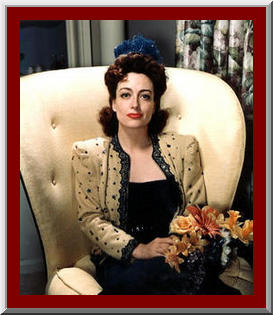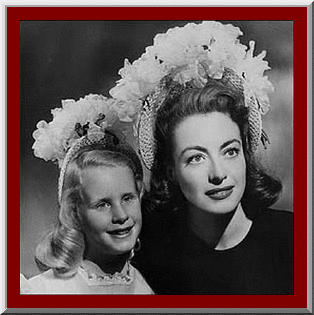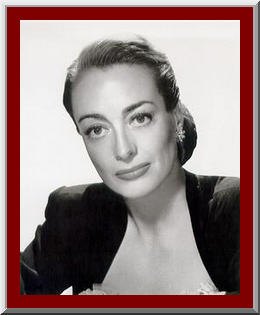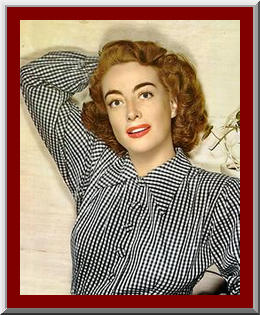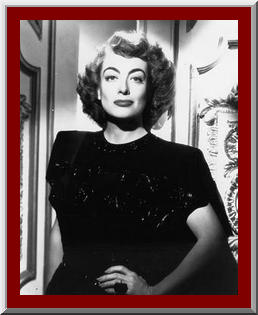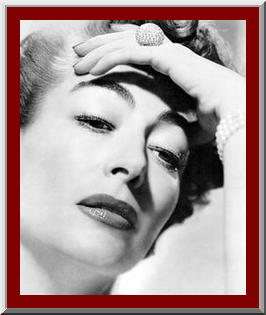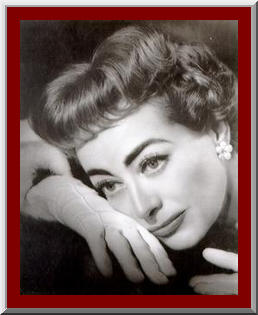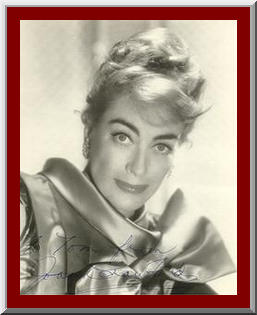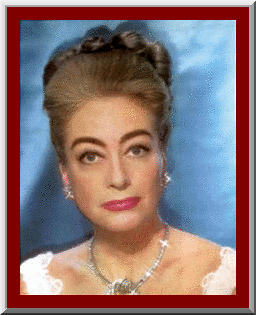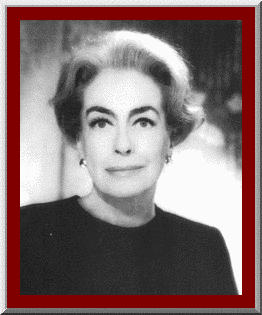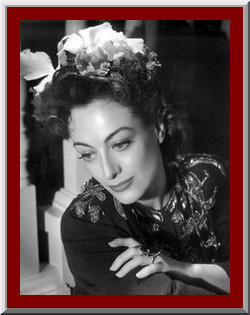





In 1940, Strange Cargo, another Gable/Crawford vehicle was received quite well. Again directed by Cukor, 1941's A Woman's Face was another major step in Crawford's comeback, but then MGM began saddling her with such poor material that she ultimately refused to continue working, resulting in a lengthy suspension. This must have been a difficult decision for Crawford given her fanatical concerns about apearances and the need to maintain the prestige of a contract with a high caliber studio like MGM. This period of uncertainty also found Joan between husbands and raising two newly adopted children, Christina and Christopher. Philip Terry, her third husband, was according to Joan, a mistake. Joan married Terry shortly after adopting her children. Joan's harsh discipline of the children was supposedly a factor in their eventual breakup. Her methods of child rearing and the exact dynamic of her relationship with her children would become a subject of bitter controversy and legend in later years. Noting that most of the best female roles at MGM were routinely going to younger actresses, Crawford was again forced to make a transition. She left MGM in 1943, after 18 years with the company. She signed on with Warners at about a third of her former salary. There Crawford only appeared briefly in 1944's Hollywood Canteen, waiting for an appropriate vehicle for her debut at the studio. She fought for the lead role in director Michael Curtiz's 1945 adaptation of the James M. Cain novel Mildred Pierce, delivering a bravura performance which won her first and only "Best Actress" Oscar. Warners, of course, quickly had a change of heart, and after the 1946 hit Humoresque the studio signed her to a new seven-year contract. Her decision to hold out for a quality script when she arrived at Warners, proved to be a very wise move. What resulted was a huge hit with Mildred Pierce, an Oscar win, as well as a rennaisaunce of her career. Crawford did some of her best work during this period, appearing in a string of well-mounted film noir classics. At Warner Brothers, Crawford was now appearing in the kinds of pictures that were routinely offered to the studio's brightest star, Bette Davis. There was a four year period that Davis and Crawford were in direct competition with each other for roles. She next appeared in 1947's Possessed, followed
by Daisy Kenyon, which cast her opposite Henry Fonda.
For 1949's Flamingo Road, meanwhile, she was reunited
with director Curtiz. However, by the early 1950s Crawford was again appearing in primarily "B"-grade pictures, and finally she bought herself out of her contract. In 1952, she produced and starred in Sudden
Fear, an excellent thriller which she offered to RKO. The studio accepted, and the film emerged as a sleeper hit. Once again, Crawford was a hot property, and she triumphantly returned to MGM to
star in 1953's Torch Song, her first color feature. For Republic, she next starred in Nicholas Ray's 1954 cult classic Johnny
Guitar, perceived by many as a thank-you to her large lesbian fan-base. The 1950s also saw Joan's fourth marriage to Alfred N. Steele, with whom she had a very good and close relationship up until his death. Steele was the president of the Pepsi-Cola company at the time of his marriage to Joan. After marrying Steele, Joan became a diligent promoter of Pepsi-Cola,
and served on it's board of directors. Between 1955 and 1957, Crawford appeared in four films, Female on the Beach, Queen Bee, Autumn Leaves and The Story of Esther Costello. Each film was less successful than the one which preceded it, and eventually the offers stopped coming in. Over the next five years, she appeared in only one picture, 1959's The Best of Everything. Then, in 1962, against all odds Crawford made yet another comeback when director Robert Aldrich teamed her with
Bette Davis in What Ever Happened To Baby Jane?, in which the actresses appeared as aging movie queens living together in exile. The film was a major hit, and thanks to its horror overtones Crawford was offered a number of similar roles, including the William Castle production Strait-Jacket. Aldrich also planned a follow-up, Hush... Hush, Sweet Charlotte, but Crawford became ill and was replaced by Olivia de Havilland. Crawford continued to work up until 1970, when she starred in the abysmal Trog. Trog was her last feature-film appearance, and she settled into retirement, penning a 1971 memoir My Way of Life. A few years later, she made one final public appearance on a daytime soap opera, taking over the role played by her adopted daughter Christina when the girl fell ill. After spending her final years in seclusion, Crawford died in New York City on May 10, 1977, but she made headlines a year later when Christina published Mommie Dearest, among the first and most famous in what became a cottage industry of tell-all books published by the children of celebrities. In it, Christina depicted her mother as vicious and unfeeling, motivated only by her desire for wealth and fame. In 1981, Faye Dunaway starred as Crawford in a feature adaptation of the book which has gone on to become a camp classic.